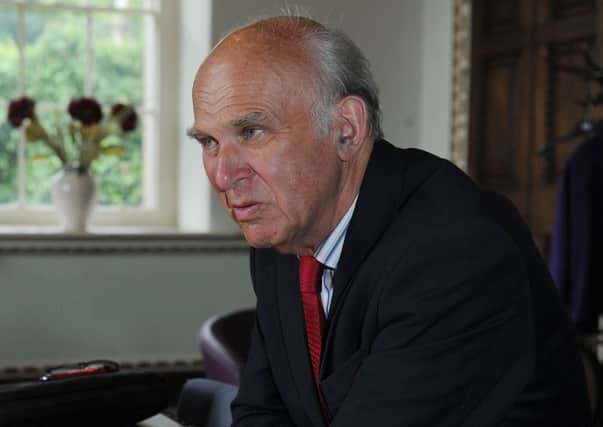Sir Vince Cable: Industry won't be revived if success stories collapse


The plant would turn wheat into bioethanol that could then be added to petrol, significantly reducing carbon emissions. As well as being the country’s biggest buyer of wheat, the by-product was 500,000 tones of high-protein livestock feed a year – meaning the plant would also become the country’s biggest supplier of animal food.
This was the then industrial strategy in action. Building on the work of Lord Mandelson and Michael Heseltine, two of my predecessors as Business Secretary, I introduced the strategy as a way of making sure government worked with the private sector in the interests of long-term growth.
Advertisement
Hide AdAdvertisement
Hide AdHigh-value sectors like aerospace, motor vehicles, energy and life sciences, in which Britain enjoyed significant skills advantages, would be targeted so that they could be properly developed beyond the lifetime of a single parliament. The economy needed to be shifted away from its dependence on debt-based consumption to focus on exports and investment.
As a result, there was a revival in confidence in cars, creative industries and oil and offshore wind and railway supply chains at a time when we were trying to create more solid economic foundations in the wake of the financial crisis.
So, it was with disappointment that I read that the Vivergo plant had stopped production this month. Losses were blamed on Government delays in making oil companies use 10 per cent bioethanol in petrol.
The strategy for this sector has been, in effect, discarded, despite the plant’s obvious success – Vivergo supports three times as many jobs in the area than when I donned an orange boiler suit and green hard hat at its opening in 2013. Essential maintenance is being undertaken to maintain employment levels, but there is no guarantee the plant will reopen.
Advertisement
Hide AdAdvertisement
Hide AdAs a Yorkshireman born and bred, whose parents worked in chocolate factories when York was a great industrial city, I want this plant – and green energy – to be part of an industrial renaissance in the county, from wind turbine manufacturing in Hull to food production in Huddersfield.
My former ministerial colleague Greg Clark finally relaunched the coalition’s Industrial Strategy at the end of last month and that is to be broadly welcomed. Greg is one of Parliament’s nice guys – genuinely constructive and, despite our political differences, I worked well with him when he was my deputy in coalition.
But I am baffled as to how an updating and rebranding of our work has taken two-and-a-half years to complete. This has left British industry in a vacuum. Unsure of Government’s ambitions for many sectors, manufacturing businesses have found it increasingly difficult to plan their investment priorities.
While the launch of the new Industrial Strategy went smoothly and contains some welcome initiatives, the document itself is underwhelming and lacks real ambition.
Advertisement
Hide AdAdvertisement
Hide AdOne of the strategy’s “grand challenges” is a commitment to “clean growth”. But, post-coalition, the Conservatives have scrapped subsidies for solar and onshore wind, cut funding for carbon capture and storage, sold off the Green Investment Bank and failed to approve the first tidal lagoon at Swansea Bay.
The strategy does little of note on skills. It is silent on the disastrous implementation of the Apprenticeship Levy, which has seen apprenticeship starts fall by 60 per cent this year. Businesses do not understand the system and there are no clear plans to help small firms that do not pay the levy. What’s more, a new National Retraining Scheme has only £40m of new funding behind it – far from adequate given the urgent need to boost productivity. We need a joined-up skills strategy alongside the Industrial Strategy, and the means to deliver it.
Another glaring failure is that the strategy does not take Brexit seriously. The document makes only passing reference to the Conservatives’ pursuit of a hard Brexit. This means leaving the Single Market and Customs Union, despite the adverse impact this will have on access to talent and supply chains, as well as additional barriers to trade.
Brexit, I suspect, was one of the reasons why this rebranding exercise took so long to complete. The complexity of the planning required to leave the EU, and the difficulty of the negotiations, has sucked the energy out of government departments across Whitehall.
Advertisement
Hide AdAdvertisement
Hide AdWhile that is an understandable consequence of triggering Article 50, the Conservatives cannot allow important policy areas like Industrial Strategy to drift any further. That will damage our economy and result in other plants and factories in Yorkshire shutting their doors at a time when we should be enjoying an industrial revival.
Sir Vince Cable MP is leader of the Liberal Democrats. He was born in York.